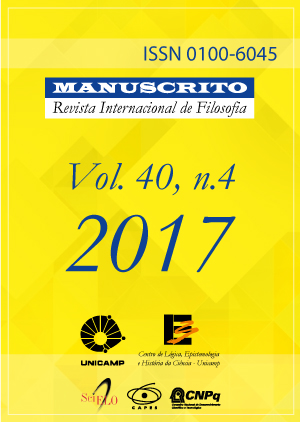Resumo
Drawing inspiration from Fred Dretske, L. S. Carrier, John A. Barker, and Robert Nozick, we develop a tracking analysis of knowing according to which a true belief constitutes knowledge if and only if it is based on reasons that are sensitive to the fact that makes it true, that is, reasons that wouldn’t obtain if the belief weren’t true. We show that our sensitivity analysis handles numerous Gettier-type cases and lottery problems, blocks pathways leading to skepticism, and validates the epistemic closure thesis that correct inferences from known premises yield knowledge of the conclusions. We discuss the plausible views of Ted Warfield and Branden Fitelson regarding cases of knowledge acquired via inference from false premises, and we show how our sensitivity analysis can account for such cases. We present arguments designed to discredit putative counterexamples to sensitivity analyses recently proffered by Tristan Haze, John Williams and Neil Sinhababu, which involve true statements made by untrustworthy informants and strange clocks that sometimes display the correct time while running backwards. Finally, we show that in virtue of employing the paradox-free subjunctive conditionals codified by Relevance Logic theorists instead of the paradox-laden subjunctive conditionals codified by Robert Stalnaker and David Lewis.Referências
ADAMS, F. & CLARKE, M. “Resurrecting the Tracking Theories”, Australasian Journal of Philosophy, 83, pp. 207-221, 2005.
ADAMS, F. "Two Non-Counterexamples to Tracking Theories of Knowledge", Logos & Episteme, 7, pp. 67-73, 2016.
ADAMS, F., BARKER, J. A., & CLARKE, M. "Beat the (Backward) Clock", Logos & Episteme, 7, pp. 353-361, 2016.
ANDERSON, A. R. & BELNAP, N. D. JR. Entailment: The Logic of Relevance and Necessity, vol. I, Princeton: Princeton University Press, 1975.
ANDERSON, A. R. and DUNN, J. M. Entailment: The Logic of Relevance and Necessity, vol. II, Princeton: Princeton University Press, 1992.
BACON, J. “The Subjunctive Conditional as Relevant Implication”, Philosophia, 1, pp. 61-80, 1971.
BARKER, J. A. A Formal Analysis of Conditionals, Carbondale, III: Southern Illinois University Monographs, 1969.
BARKER, J. A. "Knowledge and Causation", Southern Journal of Philosophy, 10, pp. 313-324, 1971.
BARKER, J. A. “Hypotheticals: Conditionals and Theticals”, The Philosophical Quarterly, 23, pp. 335-345, 1973.
BARKER, J. A. "What You Don't Know Won't Hurt You?" American Philosophical Quarterly, 13, pp. 303-308, 1976.
BARKER, J. A. & ADAMS, F. “Epistemic Closure and Skepticism”, Logos & Episteme I, 2, pp. 221-246, 2010.
BARKER, J. A. "Conclusive Reasons, Knowledge, and Action", Philosophical Issues, 22, pp. 35-52, 2012.
BELNAP, N. “Intensional Models for First Degree Formulas”, Journal of Symbolic Logic, 32, 1-22, 1967.
BENNETT, J. A Philosophical Guide to Conditionals, Oxford: Oxford University Press, 2003.
CARRIER, L. S. “An Analysis of Empirical Knowledge”, Southern Journal of Philosophy, 9, pp. 3-11, 1971.
CHISHOLM, R. Theory of Knowledge, 1st Edition, Englewood Cliffs, N. J.: Prentice Hall, 1966.
DRETSKE, F. “Conclusive Reasons”, Australasian Journal of Philosophy, 49, pp. 1– 22, 1971.
DRETSKE, F. “Reply to Hawthorne” in Steup, M. and Sosa, E. (eds.), Contemporary Debates in Epistemology, Malden, MA: Blackwell, pp. 43–46, 2005.
FITELSON, B. “Strengthening the Case for Knowledge from Falsehood”, Analysis, 70, pp. 666-669, 2010.
GETTIER, E. “Is Justified True Belief Knowledge?” Analysis, 23, pp. 121–123, 1963.
GOLDMAN, A. “What is Justified Belief?” in Sosa, E. and Kim, J. (eds.), Epistemology: An Anthology, Blackwell, pp. 340-353, 1979.
GOODMAN, N. Fact, Fiction and Forecast, New York: Bobbs-Merrill, 1955.
HAZE, T. "Two New Counterexamples to Truth-Tracking Theories of Knowledge", Logos & Episteme, 3, pp. 309-11, 2015.
KLEIN, P. Certainty: A Refutation of Scepticism, Minneapolis: University of Minnesota Press, 1981.
LEWIS, D. Counterfactuals, Cambridge, MA: Harvard University Press, 1973.
LYCAN, W. “On the Gettier Problem Problem”, in Hetherington, S. (ed.) Epistemology Futures, Oxford University Press, pp. 148-168, 2006.
MARES, E. Relevant Logic: A Philosophical Interpretation, Cambridge: Cambridge University Press, 2004.
NOZICK, R. Philosophical Explanations, Cambridge, MA: Harvard University Press, 1981.
RAMSEY, F. "General Propositions and Causality" in Ramsey, F., Foundations of Mathematics and other Logical Essays, Oxford: Routledge and Kegan Paul, pp. 237-257, 1931.
SHOPE, R. The Analysis of Knowing: A Decade of Research, Princeton: Princeton University Press, 1983.
SOSA, E. "How to Defeat Opposition to Moore", Philosophical Perspectives, 13, pp. 141-153, 1999.
STALNAKER, R. “A Theory of Conditionals”, Studies in Logical Theory, American Philosophical Quarterly Monograph, 2, pp. 98-112, 1968.
WARFIELD, T. “Knowledge from Falsehood”, Philosophical Perspectives, 19, Epistemology: pp. 405-416, 2005.
WILLIAMS, J. & SINHABABU, N. "The Backward Clock, Truth-Tracking, and Safety", Journal of Philosophy, 112 (1), pp. 46-55, 2015.

